Boyle J.A. The Cambridge History of Iran, Volume 5: The Saljuq and Mongol Periods
Подождите немного. Документ загружается.

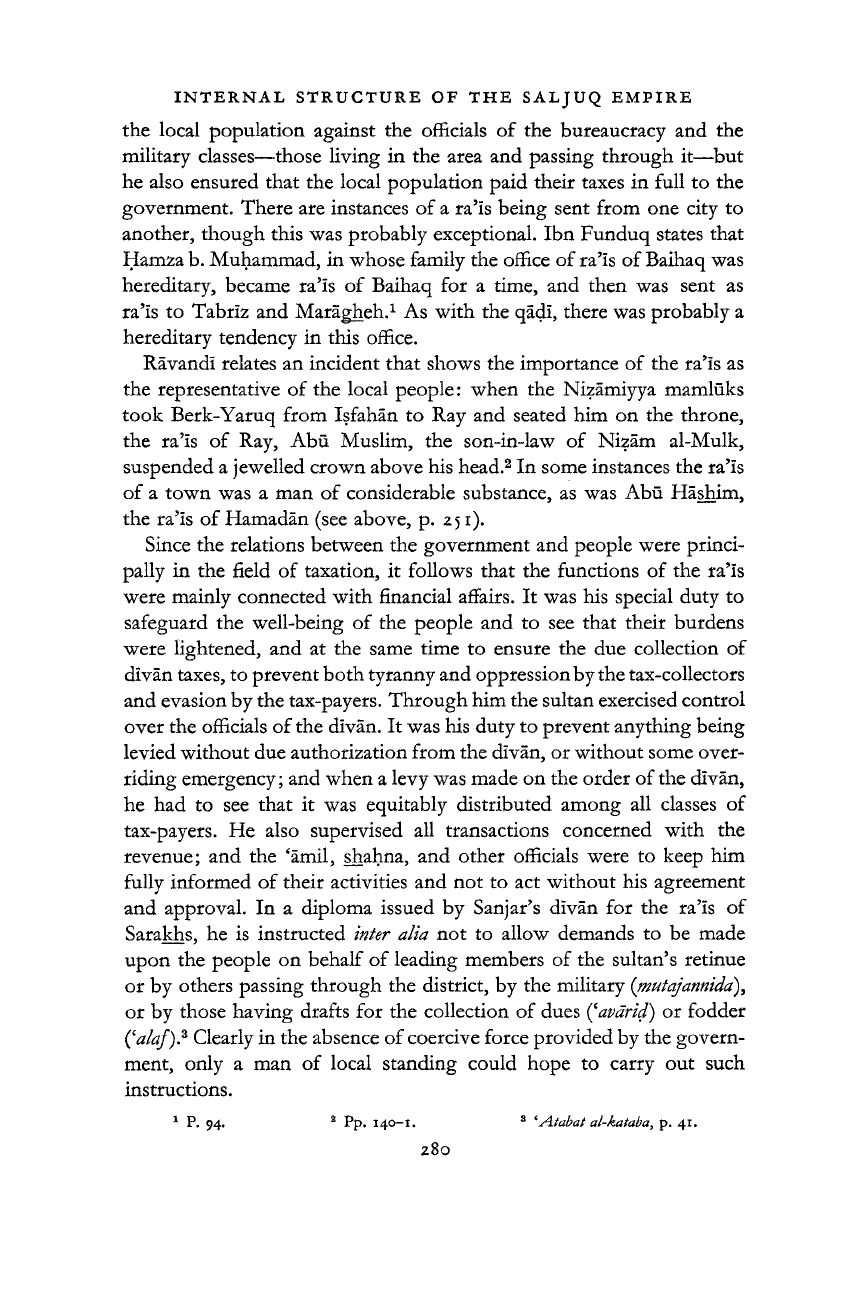
INTERNAL
STRUCTURE
OF THE SALJUQ EMPIRE
280
the local population against the officials of the bureaucracy and the
military classes—those living in the area and passing through it—but
he also ensured
that
the local population paid their taxes in full to the
government. There are instances of a ra'is being sent from one city to
another,
though this was probably exceptional. Ibn Funduq states
that
Hamza b. Muhammad, in whose family the
office
of ra'is of Baihaq was
hereditary, became ra'is of Baihaq for a time, and
then
was sent as
ra'is to Tabriz and Mara
gheh.
1
As with the qadi,
there
was probably a
hereditary tendency in this
office.
Ravandi relates an incident
that
shows the importance of the ra'is as
the representative of the local people: when the Nizamiyya mamluks
took Berk-Yaruq from Isfahan to Ray and seated him on the throne,
the ra'is of Ray, Abu Muslim, the son-in-law of Nizam al-Mulk,
suspended a jewelled crown above his head.
2
In some instances the ra'is
of
a town was a man of considerable substance, as was Abu Hashim,
the ra'is of Hamadan (see above, p. 251).
Since
the relations between the government and people were princi-
pally
in the field of taxation, it
follows
that
the functions of the ra'is
were
mainly connected with financial affairs. It was his special duty to
safeguard the well-being of the people and to see
that
their burdens
were
lightened, and at the same time to ensure the due collection of
divan taxes, to prevent both tyranny and oppression
by
the tax-collectors
and evasion by the tax-payers. Through him the sultan exercised control
over
the officials of the divan. It was his duty to prevent anything being
levied
without due authorization from the divan, or without some over-
riding emergency; and when a
levy
was made on the order of the divan,
he had to see
that
it was equitably distributed among all classes of
tax-payers. He also supervised all transactions concerned with the
revenue; and the 'amil, shahna, and other officials were to keep him
fully
informed of their activities and not to act without his agreement
and approval. In a diploma issued by Sanjar's divan for the ra'is of
Sarakhs, he is instructed inter alia not to allow demands to be made
upon the people on behalf of leading members of the sultan's
retinue
or by others passing through the district, by the military
(mutajannida),
or by those having drafts for the collection of dues
(favdrid)
or fodder
(falaj)? Clearly in the absence of
coercive
force provided by the govern-
ment, only a man of local standing could hope to carry out such
instructions.
1
P. 94.
2
Pp.
140-1.
3 6
Atabat
al-kataba,
p. 41.
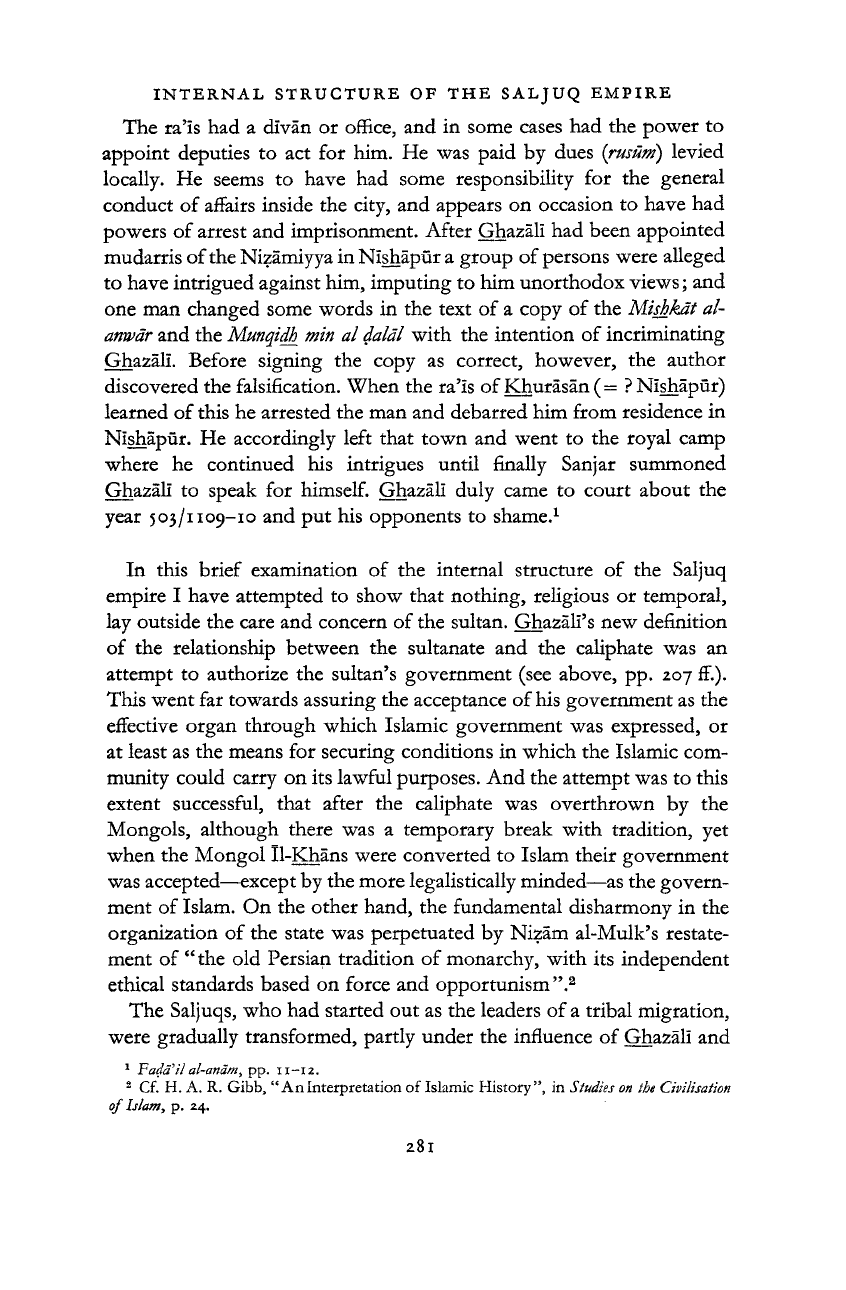
INTERNAL
STRUCTURE
OF THE SALJUQ EMPIRE
28l
The
ra'is had a divan or
office,
and in some cases had the power to
appoint deputies to act for him. He was paid by dues
(rusum)
levied
locally.
He seems to have had some responsibility for the general
conduct of affairs inside the city, and appears on occasion to have had
powers
of
arrest
and imprisonment. After Ghazali had been appointed
mudarris
of
the
Nizamiyya
in Nishapur a group of persons were alleged
to have intrigued against him, imputing to him unorthodox
views;
and
one man changed some words in the text of a copy of the Mishkat al-
anwdr
and the Munqidh min al daldl with the intention of incriminating
Ghazali.
Before signing the copy as correct, however, the
author
discovered
the falsification. When the ra'is of Khurasan (=
?
Nishapur)
learned of this he arrested the man and debarred him from residence in
Nishapur. He accordingly left
that
town and went to the royal camp
where he continued his intrigues until finally Sanjar summoned
Ghazali
to speak for himself. Ghazali duly came to court about the
year
503/1109-10
and put his opponents to shame.
1
In this brief examination of the internal
structure
of the Saljuq
empire I have attempted to show
that
nothing, religious or temporal,
lay
outside the care and concern of the sultan. Ghazali's new definition
of
the relationship between the sultanate and the caliphate was an
attempt
to authorize the sultan's government (see above, pp. 207 ff.).
This
went far towards assuring the acceptance of his government as the
effective
organ through which Islamic government was expressed, or
at least as the means for securing conditions in which the Islamic com-
munity could carry on its lawful purposes. And the
attempt
was to this
extent successful,
that
after the caliphate was overthrown by the
Mongols,
although
there
was a temporary break with tradition, yet
when
the Mongol Il-Khans were converted to Islam their government
was
accepted—except by the more
legalistically
minded—as the govern-
ment of Islam. On the other
hand,
the fundamental disharmony in the
organization of the
state
was perpetuated by Nizam al-Mulk's restate-
ment of "the old Persian tradition of monarchy, with its independent
ethical
standards
based on force and opportunism".
2
The
Saljuqs, who had
started
out as the leaders of a tribal migration,
were
gradually transformed, partly
under
the influence of Ghazali and
1
Fadd'ilal-andm,
pp.
11-12.
2
Cf.
H.
A.
R.
Gibb,
"AnInterpretation
of
Islamic History", in
Studies
on
the
Civilisation
of
Islam,
p. 24.
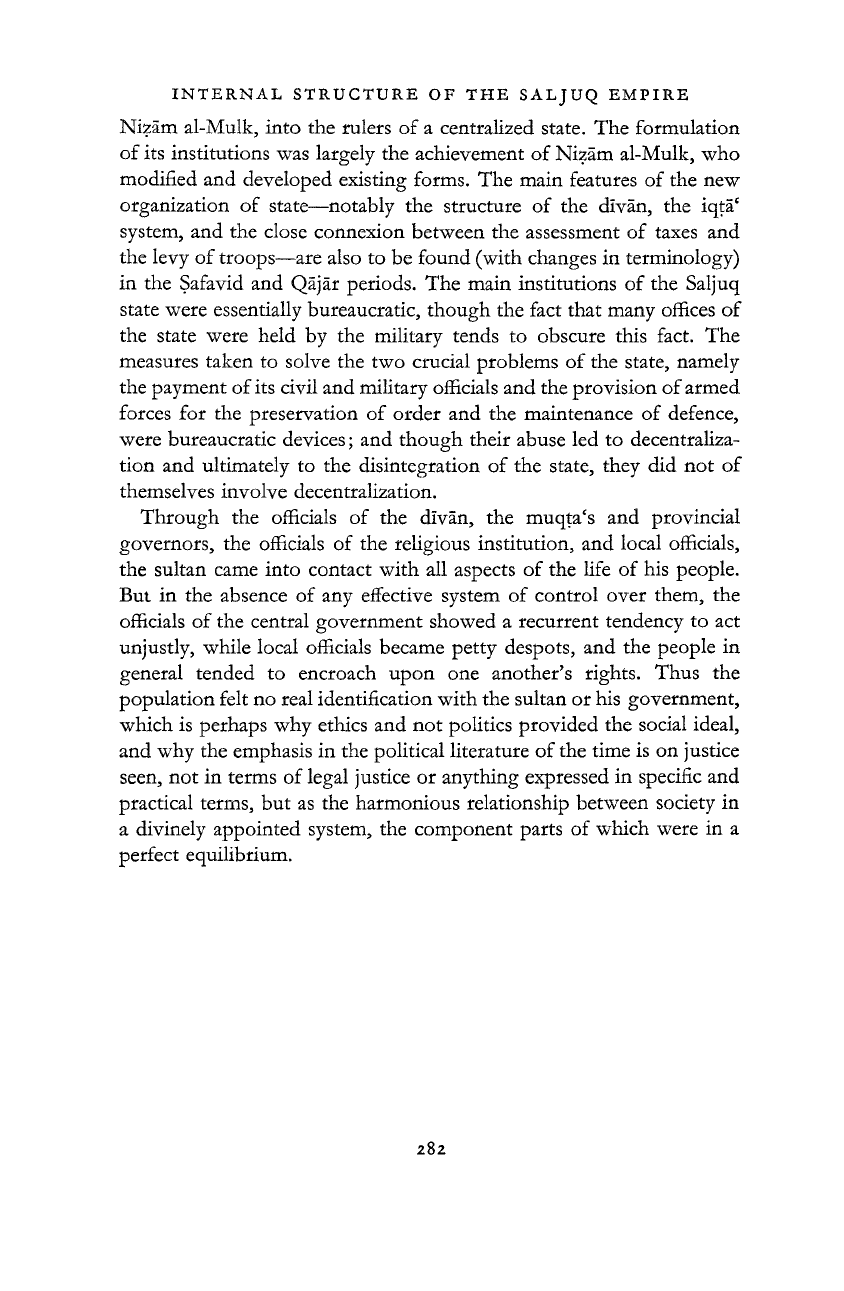
INTERNAL
STRUCTURE
OF THE
SALJUQ
EMPIRE
282
Nizam
al-Mulk, into the rulers of a centralized state. The formulation
of
its institutions was largely the achievement of Nizam al-Mulk, who
modified
and developed existing forms. The main features of the new
organization of state—notably the structure of the divan, the iqta
c
system,
and the close connexion between the assessment of taxes and
the
levy
of troops—are also to be found (with changes in terminology)
in the Safavid and Qajar periods. The main institutions of the Saljuq
state
were essentially bureaucratic, though the fact
that
many
offices
of
the
state
were held by the military tends to obscure this fact. The
measures taken to solve the two crucial problems of the state, namely
the payment of its
civil
and military officials and the provision of armed
forces
for the preservation of order and the maintenance of defence,
were
bureaucratic devices; and though their abuse led to decentraliza-
tion and ultimately to the disintegration of the state, they did not of
themselves
involve decentralization.
Through
the officials of the divan, the muqta's and provincial
governors,
the officials of the religious institution, and local
officials,
the sultan came into contact with all aspects of the
life
of his people.
But
in the absence of any effective system of control over them, the
officials
of the central government showed a recurrent tendency to act
unjustly, while local officials became petty despots, and the people in
general tended to encroach upon one another's rights. Thus the
population felt no real identification with the sultan or his government,
which
is perhaps why ethics and not politics provided the social ideal,
and why the emphasis in the political literature of the time is on justice
seen, not in terms of legal justice or anything expressed in specific and
practical terms, but as the harmonious relationship between society in
a divinely appointed system, the component
parts
of which were in a
perfect
equilibrium.
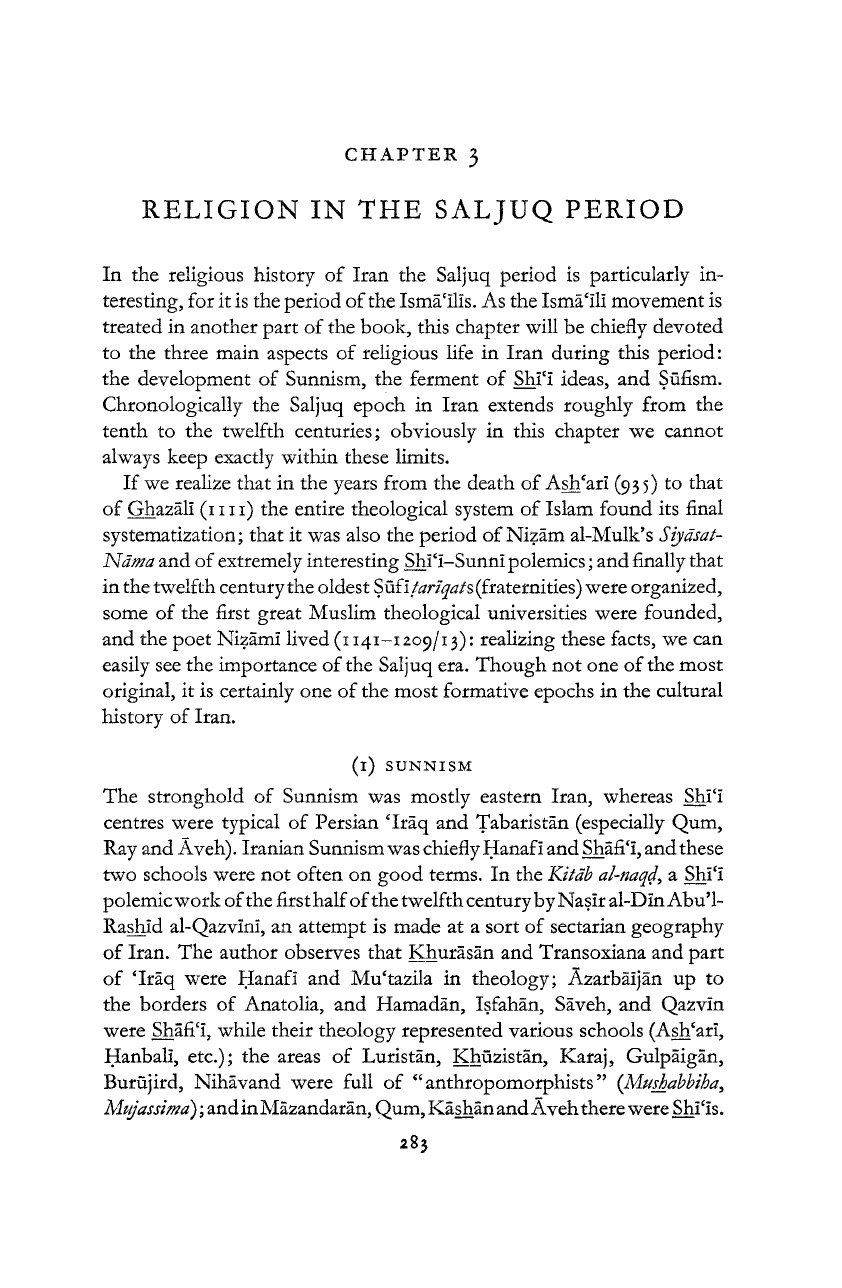
CHAPTER
3
RELIGION
IN THE SALJUQ PERIOD
In the religious history of
Iran
the Saljuq period is particularly in-
teresting, for it is the period
of
the Isma'ilis. As the Isma'ili movement is
treated
in another
part
of the book, this chapter
will
be chiefly devoted
to the
three
main aspects of religious life in
Iran
during this period:
the development of Sunnism, the ferment of Shi'i ideas, and Sufism.
Chronologically
the Saljuq epoch in
Iran
extends roughly from the
tenth
to the twelfth centuries; obviously in this chapter we cannot
always
keep exactly within these limits.
If
we realize
that
in the years from the death of Ash'ari (935) to
that
of
Ghazali
(1111)
the
entire
theological system of Islam found its final
systematization;
that
it was also the period of Nizam al-Mulk's
Siydsat-
Ndma
and of extremely interesting Shrt-Sunni
polemics;
and finally
that
in the twelfth century the oldest
Su£i
fariqafs (fraternities) were organized,
some of the first great Muslim theological universities were founded,
and the poet Nizami lived
(1141-1209/13):
realizing these facts, we can
easily
see the importance of the Saljuq era. Though not one of the most
original, it is certainly one of the most formative epochs in the cultural
history of
Iran.
(1)
SUNNISM
The stronghold of Sunnism was mostly eastern
Iran,
whereas Shi'i
centres were typical of Persian
"Iraq
and Tabaristan (especially Qum,
Ray
and
Aveh).
Iranian
Sunnism
was
chiefly Hanaf
I
and Shafi'i, and these
two
schools were not often on good terms. In the Kitdb al-naqd, a Shi'i
polemic
work
of
the first
half
of
the twelfth century
by
Nasir
al-Din
Abu'l-
Rashid al-Qazvini, an
attempt
is made at a sort of sectarian geography
of
Iran.
The
author
observes
that
Khurasan and Transoxiana and
part
of
'Iraq
were Hanafi and Mu
c
tazila in theology; Azarbaijan up to
the borders of Anatolia, and Hamadan, Isfahan, Saveh, and Qazvin
were Shafi'i, while their theology represented various schools (Ash'ari,
Hanbali, etc.); the areas of Luristan, Khuzistan, Karaj, Gulpaigan,
Bumjird, Nihavand were full of " anthropomorphists" (Mushabbiha,
Mujassimd); and in Mazandaran, Qum, Kashan and
Aveh
there
were Shi
c
is.
283
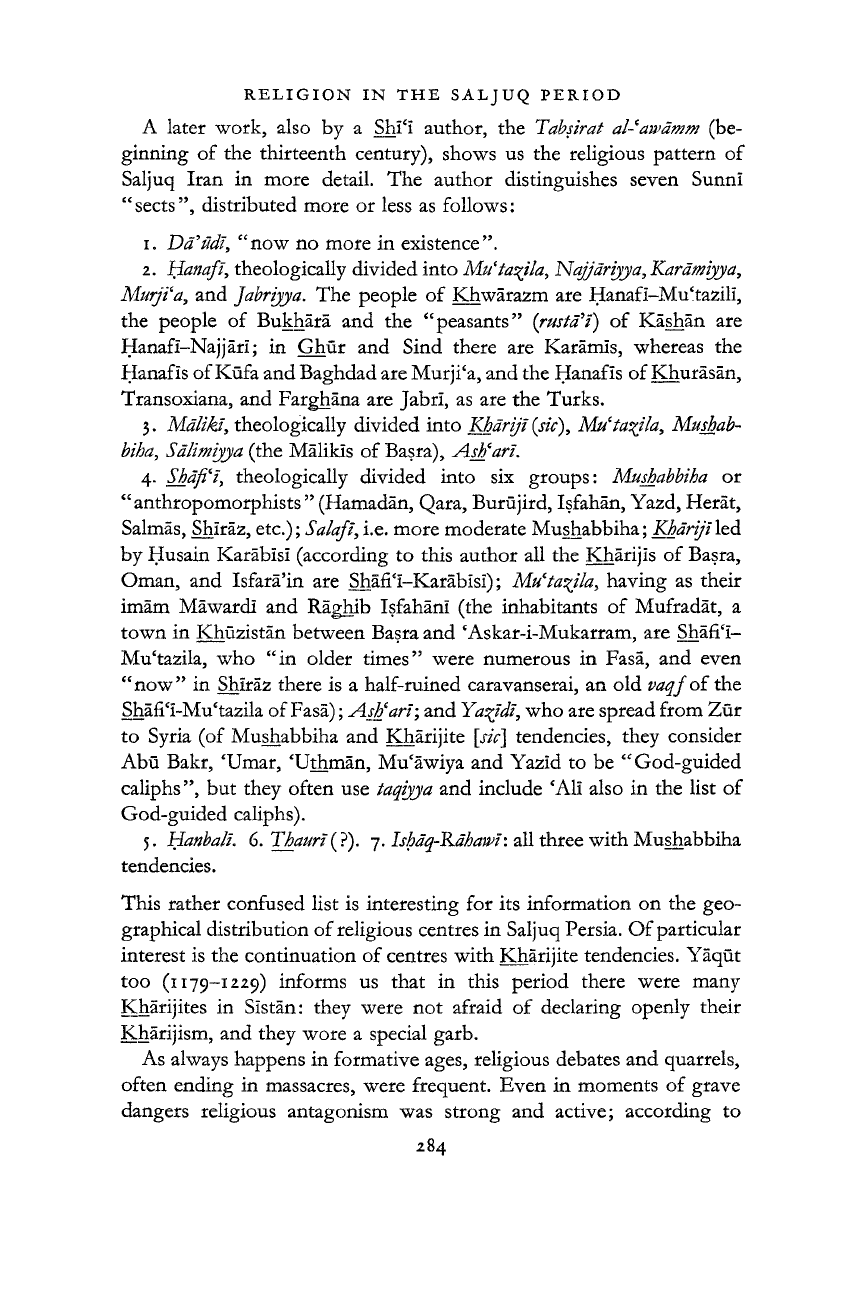
RELIGION
IN THE
SALJUQ
PERIOD
284
A
later work, also by a Shfi
author,
the Tabsirat
al-aivdmm
(be-
ginning of the
thirteenth
century), shows us the religious
pattern
of
Saljuq
Iran
in more detail. The
author
distinguishes seven Sunni
" sects ", distributed more or less as
follows:
1.
Dd'udl, "now no more in existence".
2.
Hanaf I, theologically divided into Mu'ta^ila,
Najjdriyya,
Kardmiyya,
Mur/Ta, and
Jabriyya.
The people of Khwarazm are Hanafi-Mu'tazili,
the people of Bu
khara and the "peasants"
(rustd'i)
of Kashan are
Hanafi-Najjari; in Ghur and Sind
there
are Karamis, whereas the
Hanafis
of
Kufa
and Baghdad are Murji'a, and the Hanafis of Khurasan,
Transoxiana, and Fa
rghana are
Jabri,
as are the Turks.
3. Mdlikiy theologically divided into Khdriji(sic\ Mu'ta^ila, Mushab-
biha,
Sdlimiyya
(the Malikis of Basra), AsWari.
4.
Shaft,
theologically divided into six groups: Mushabbiha or
" anthropomorphists " (Hamadan, Qara, Bumjird, Isfahan,
Yazd,
Herat,
Salmas,
Shiraz, etc.); Salafi, i.e. more moderate Mushabbiha; Khdriji ltd.
by
Husain Karabisi (according to this
author
all the Kharijis of Basra,
Oman, and Isfara'in are Shafi
c
i-Karabisi); Mu'ta^ila, having as their
imam Mawardi and Ra
ghib Isfahani (the
inhabitants
of Mufradat, a
town in Khuzistan between Basra and
c
Askar-i-Mukarram, are Shafi'i-
Mu'tazila, who "in older times" were numerous in Fasa, and even
"now" in Shiraz
there
is a half-ruined caravanserai, an old vaqf
of
the
Shafi
c
i-Mu
c
tazila
of
Fasa); Asb'ari; and Ya^idi, who are spread from Zur
to Syria (of Mushabbiha and Kharijite [sic] tendencies, they consider
Abu
Bakr, 'Umar, 'Uthman, Mu'awiya and
Yazid
to be "God-guided
caliphs", but they often use
taqiyya
and include
c
Ali
also in the list of
God-guided caliphs).
5.
Hanbali. 6. Thauri(?). 7. Ishdq-Rdhawi: all
three
with Mushabbiha
tendencies.
This
rather
confused list is interesting for its information on the
geo-
graphical distribution of religious centres in Saljuq Persia.
Of
particular
interest is the continuation of centres with Kharijite tendencies. Yaqut
too
(1179-1229)
informs us
that
in this period
there
were many
Kharijites in Sistan: they were not afraid of declaring openly their
Kharijism, and they wore a special garb.
As
always happens in formative ages, religious debates and quarrels,
often ending in massacres, were frequent. Even in moments of grave
dangers religious antagonism was strong and active; according to
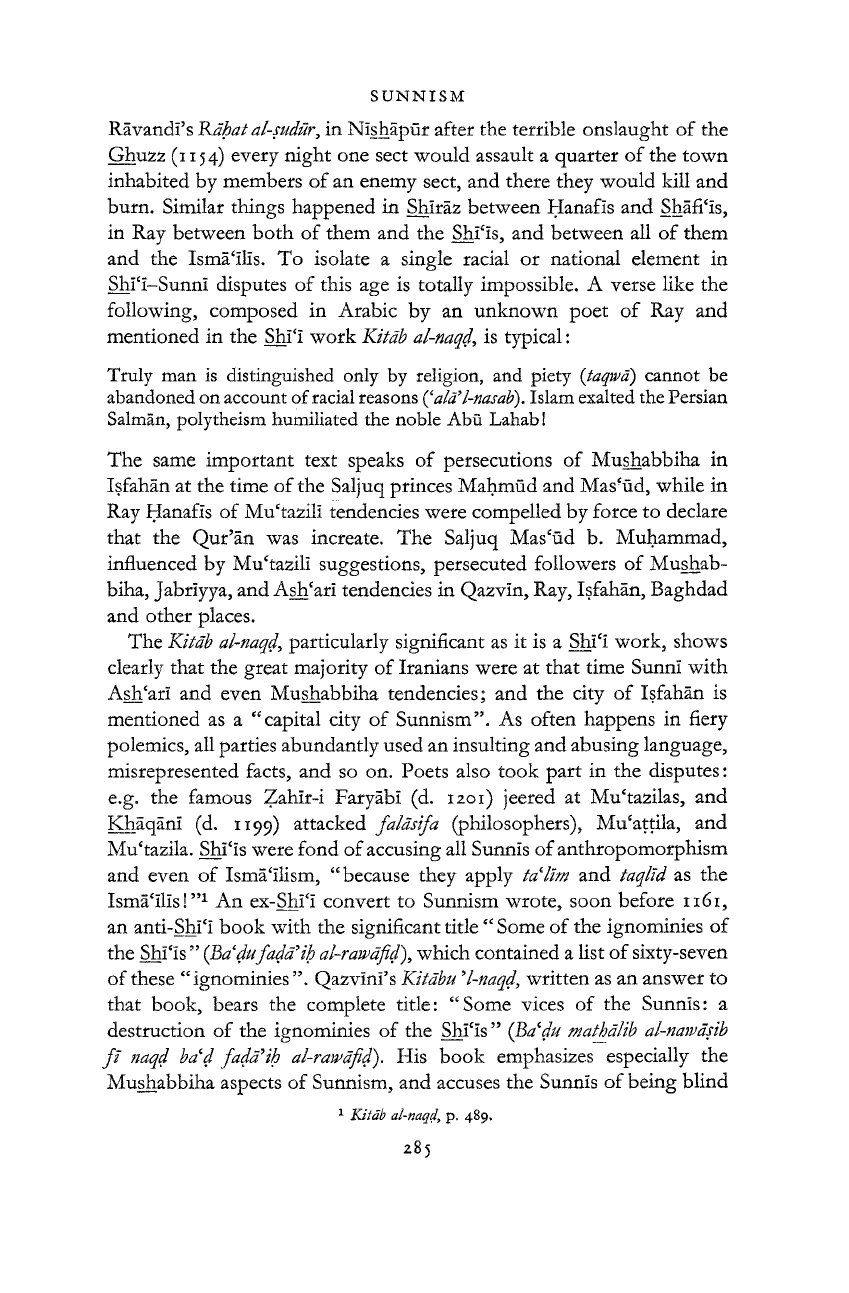
SUNNISM
285
Ravandi's
Rabat
a/-sudur,
in Nishapur after the terrible onslaught of the
Ghuzz
(i
154)
every night one sect would assault a
quarter
of the town
inhabited by members of an enemy sect, and
there
they would
kill
and
burn.
Similar things happened in Shiraz between Hanafis and Shafi'is,
in Ray between both of them and the Shi'is, and between all of them
and the Isma'ilis. To isolate a single racial or national element in
Shi'I-Sunni disputes of this age is totally impossible. A verse like the
following,
composed in Arabic by an unknown poet of Ray and
mentioned in the Shi'i work Kitab
al-naqd,
is typical:
Truly
man is distinguished only by religion, and piety
(taqwa)
cannot be
abandoned on account
of
racial
reasons
(fald'l-nasab).
Islam exalted the Persian
Salman,
polytheism humiliated the noble Abu Lahab!
The
same important text speaks of persecutions of Mushabbiha in
Isfahan at the time of the Saljuq princes Mahmud and Mas'ud, while in
Ray
Hanafis of Mu'tazili tendencies were compelled by force to declare
that
the Qur'an was increate. The Saljuq Mas'ud b. Muhammad,
influenced
by Mu'tazili suggestions, persecuted followers of Mushab-
biha, Jabriyya, and Ash'ari tendencies in
Qazvin,
Ray, Isfahan, Baghdad
and other places.
The
Kitab
al-naqd,
particularly significant as it is a Shi
c
i work, shows
clearly
that
the great majority of
Iranians
were at
that
time Sunni with
Ash'ari
and even Mushabbiha tendencies; and the city of Isfahan is
mentioned as a " capital city of Sunnism". As often happens in fiery
polemics,
all parties abundantly used an insulting and abusing language,
misrepresented facts, and so on. Poets also took
part
in the disputes:
e.g.
the famous Zahir-i Faryabi (d. 1201) jeered at Mu'tazilas, and
Khaqani
(d. 1199) attacked faldsifa (philosophers), Mu'attila, and
Mu'tazila.
Shi'is were fond of
accusing
all Sunnis
of
anthropomorphism
and even of Isma'ilism, " because they apply
ta'lim
and taqlid as the
Isma'ilis!"
1
An ex-Shi'i convert to Sunnism wrote, soon before
1161,
an anti-Shi'i book with the significant title " Some of the ignominies of
the
Shi'is
" (Ba'dufadd'ih
al-rawdfid),
which contained a list of
sixty-seven
of
these "ignominies".
Qazvini's
Kitdbu
'l-naqd,
written as an answer to
that
book, bears the complete title: " Some
vices
of the Sunnis: a
destruction of the ignominies of the
Shi'is
" (Ba'du mathdlib
al-nawdsib
fi naqd ba'd fadd'ih al-rawdfid). His book emphasizes especially the
Mushabbiha aspects of Sunnism, and accuses the Sunnis of being blind
1
Kitab
al-naqd,
p. 489.
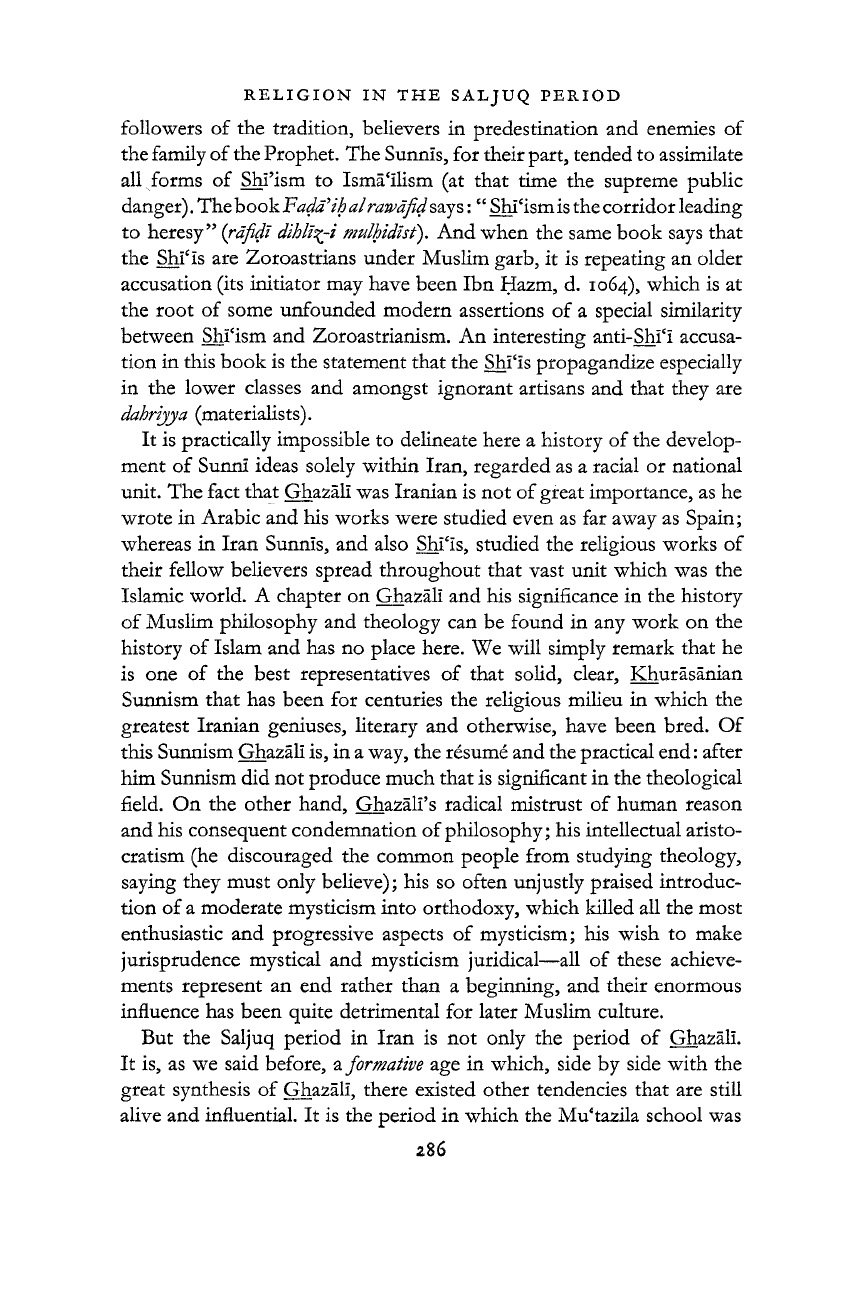
RELIGION
IN THE
SALJUQ
PERIOD
286
followers
of the tradition, believers in predestination and enemies of
the family of the Prophet. The Sunnis, for their
part,
tended to assimilate
all
forms of Shfism to Isma'ilism (at
that
time the supreme public
danger).
The
book
Fadd'ihalrawdfid
says:
"
Shi'ismis
the corridor leading
to heresy"
{rdfidi
dihli^-i mulhidist). And when the same book says
that
the Shi'is are Zoroastrians under Muslim garb, it is repeating an older
accusation (its initiator may have been Ibn Hazm, d. 1064), which is at
the root of some unfounded modern assertions of a special similarity
between
Shi'ism and Zoroastrianism. An interesting anti-Shi'i accusa-
tion in this book is the statement
that
the Shi'is propagandize especially
in the lower classes and amongst ignorant artisans and
that
they are
dahriyja (materialists).
It is practically impossible to delineate here a history of the develop-
ment of Sunni ideas solely within
Iran,
regarded as a racial or national
unit. The fact
that
Ghazali was Iranian is not of great importance, as he
wrote in Arabic and his works were studied even as far away as Spain;
whereas in
Iran
Sunnis, and also Shi'is, studied the religious works of
their
fellow
believers spread throughout
that
vast unit which was the
Islamic world. A chapter on Ghazali and his significance in the history
of
Muslim philosophy and theology can be found in any work on the
history of Islam and has no place here. We
will
simply remark
that
he
is
one of the best representatives of
that
solid, clear, Khurasanian
Sunnism
that
has been for centuries the religious milieu in which the
greatest Iranian geniuses, literary and otherwise, have been bred. Of
this Sunnism Ghazali
is,
in a
way,
the resume and the practical end: after
him Sunnism did not produce much
that
is significant in the theological
field.
On
the other hand, Ghazali's radical mistrust of human reason
and his consequent condemnation
of
philosophy;
his intellectual aristo-
cratism (he discouraged the common people from studying theology,
saying
they must only
believe);
his so often unjustly praised introduc-
tion of a moderate mysticism into orthodoxy, which killed all the most
enthusiastic and progressive aspects of mysticism; his wish to make
jurisprudence mystical and mysticism juridical—all of these achieve-
ments represent an end
rather
than
a beginning, and their enormous
influence
has been quite detrimental for later Muslim culture.
But
the Saljuq period in
Iran
is not only the period of Ghazali.
It is, as we said before, a formative age in which, side by side with the
great synthesis of Ghazali, there existed other tendencies
that
are still
alive
and influential. It is the period in which the Mu'tazila school was
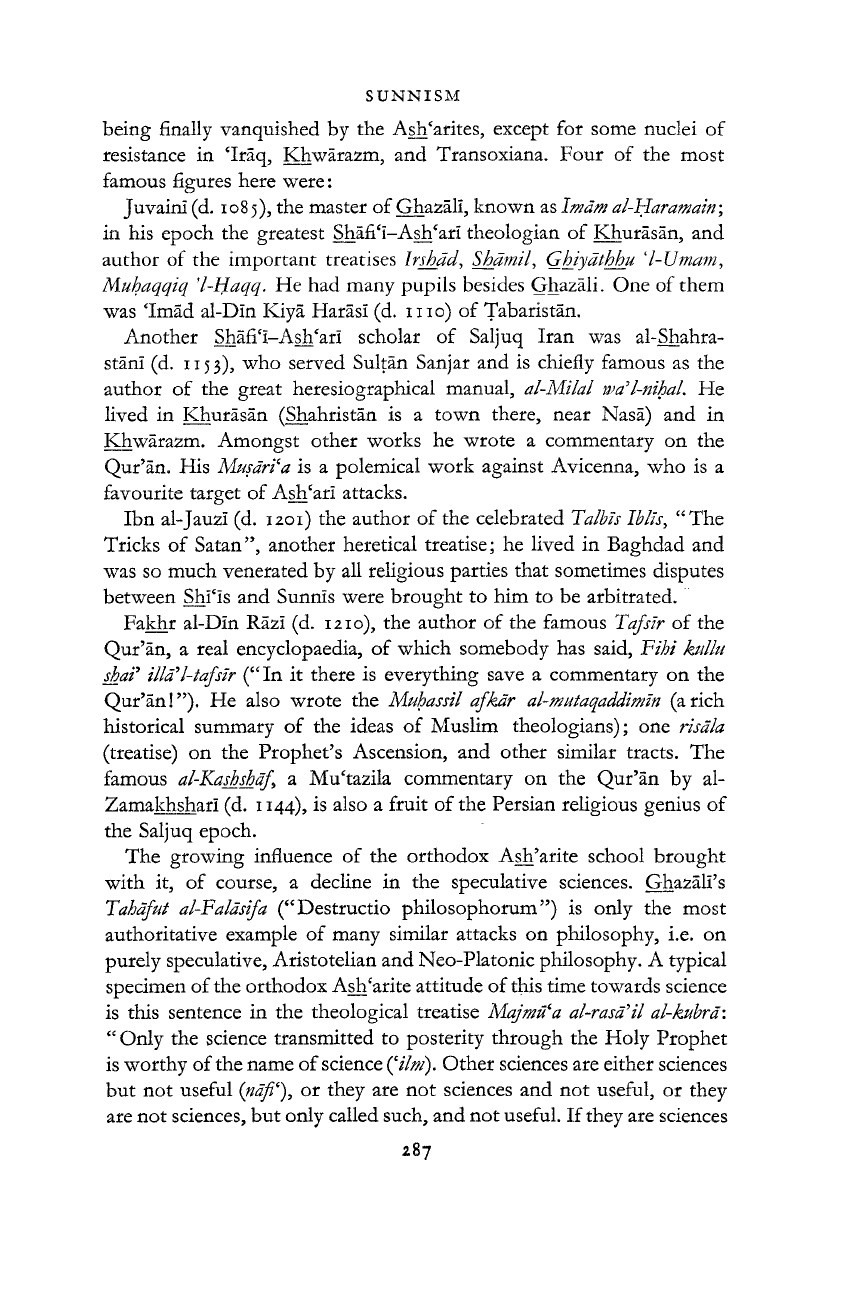
SUNNISM
287
being
finally vanquished by the Ash'arites, except for some nuclei of
resistance in
Iraq,
Khwarazm, and Transoxiana. Four of the most
famous figures here were:
Juvaini (d.
1085),
the master of
Ghazali,
known as
Imam
al-YLaramain
\
in his epoch the greatest Shafi'i-Ash'ari theologian of Khurasan, and
author
of the important treatises
Irshad,
Shdmil, Ghiydthhu 'l-Umam,
Muhaqqiq 'l-Haqq. He had many pupils besides Ghazali. One of them
was
'Imad al-Din
Kiya
Harasi (d.
1110)
of Tabaristan.
Another
Shafi'i-Ash'ari scholar of Saljuq
Iran
was al-Shahra-
stani (d.
1153),
who served Sultan Sanjar and is chiefly famous as the
author
of the great heresiographical manual, al-Milal
waH-nihal.
He
lived
in Khurasan (Shahristan is a town there, near Nasa) and in
Khwarazm.
Amongst other works he wrote a commentary on the
Qur'an. His Musdri'a is a polemical work against Avicenna, who is a
favourite
target of Ash'ari attacks.
Ibn al-Jauzi (d. 1201) the
author
of the celebrated Talbis Iblis, "The
Tricks
of Satan", another heretical treatise; he lived in Baghdad and
was
so much venerated by all religious parties
that
sometimes disputes
between
Shi'is and Sunnis were brought to him to be
arbitrated.
Fakhr al-Din Razi (d.
1210),
the
author
of the famous Tafsir of the
Qur'an, a real encyclopaedia, of which somebody has said, Fibi kullu
sbai' ilia?l-tafsir ("In it
there
is everything save a commentary on the
Qur'an!"). He also wrote the Muhassil
afkdr
al-mutaqaddimin
(arich
historical summary of the ideas of Muslim theologians); one risdla
(treatise) on the Prophet's Ascension, and other similar tracts. The
famous
al-Kasbshdf,
a Mu'tazila commentary on the Qur'an by al-
Zamakhshari (d.
1144),
is also a fruit of the Persian religious genius of
the Saljuq epoch.
The
growing influence of the orthodox Ash'arite school brought
with
it, of course, a decline in the speculative sciences. Ghazali's
Tahdfut
al-Faldsifa ("Destructio philosophorum") is only the most
authoritative example of many similar attacks on philosophy, i.e. on
purely speculative, Aristotelian and Neo-Platonic philosophy. A typical
specimen
of the orthodox Ash'arite
attitude
of this time towards science
is
this sentence in the theological treatise Ma/mu'a al-rasd'il al-kubrd:
"Only
the science
transmitted
to posterity through the Holy Prophet
is
worthy of the name of
science
(film). Other sciences are either sciences
but not useful (ndfi
1
), or they are not sciences and not useful, or they
are not
sciences,
but only called such, and not useful. If they are sciences
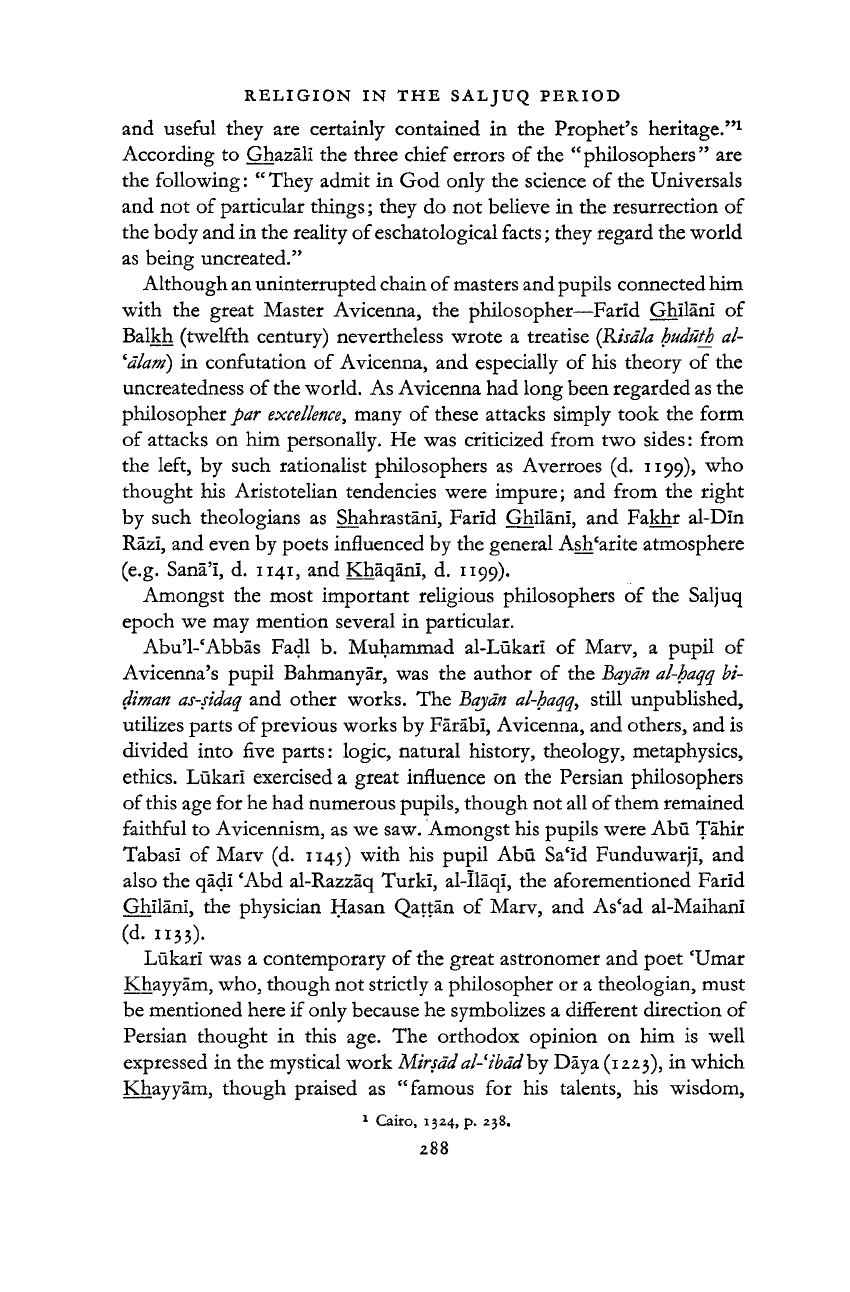
RELIGION
IN THE
SALJUQ
PERIOD
and useful they are certainly contained in the Prophet's heritage."
1
According
to Ghazali the
three
chief
errors
of the "philosophers" are
the
following:
"They admit in God only the science of the Universals
and not of particular things; they do not believe in the resurrection of
the body and in the reality of
eschatological
facts; they regard the world
as being uncreated."
Although
an
uninterrupted
chain of masters and pupils connected him
with
the great Master Avicenna, the philosopher—Farid Ghilani of
Balkh
(twelfth century) nevertheless wrote a treatise (Risdla
huduth
al-
'dlam)
in confutation of
Avicenna,
and especially of his theory of the
uncreatedness of the world. As
Avicenna
had long been regarded as the
philosopher par
excellence,
many of these attacks simply took the form
of
attacks on him personally. He was criticized from two sides: from
the left, by such rationalist philosophers as Averroes (d.
1199),
who
thought his Aristotelian tendencies were impure; and from the right
by
such theologians as Shahrastani, Farid Ghilani, and Fakhr al-Din
Razi,
and even by poets influenced by the general Ash'arite atmosphere
(e.g.
Sana'i, d.
1141,
and Khaqani, d.
1199).
Amongst
the most important religious philosophers of the Saljuq
epoch
we may mention several in particular.
Abu'l-'Abbas
Fadl b. Muhammad al-Lukari of Marv, a pupil of
Avicenna's
pupil Bahmanyar, was the
author
of the
Baydn
al-haqq bi-
diman
as-sidaq and other works. The
Baydn
al-haqq, still unpublished,
utilizes
parts
of previous works by Farabi,
Avicenna,
and others, and is
divided
into
five
parts:
logic,
natural
history, theology, metaphysics,
ethics.
Lukari exercised a great influence on the Persian philosophers
of
this age for he had numerous pupils, though not all of them remained
faithful
to
Avicennism,
as we saw. Amongst his pupils were Abu Tahir
Tabasi
of Marv (d. 1145)
wlt
k his pupil Abu Sa'id Funduwarji, and
also
the qadi
c
Abd
al-Razzaq Turki, al-Ilaqi, the aforementioned Farid
Ghilani,
the physician Hasan Qattan of Marv, and As'ad al-Maihani
(d.
1133).
Lukari
was a contemporary of the great astronomer and poet 'Umar
Khayyam,
who, though not strictly a philosopher or a theologian, must
be mentioned here if only because he symbolizes a different direction of
Persian thought in this age. The orthodox opinion on him is
well
expressed
in the mystical work Mirsddal-ibddby Daya
(1223),
in which
Khayyam,
though praised as "famous for his talents, his wisdom,
1
Cairo,
1324,
p. 238.
288
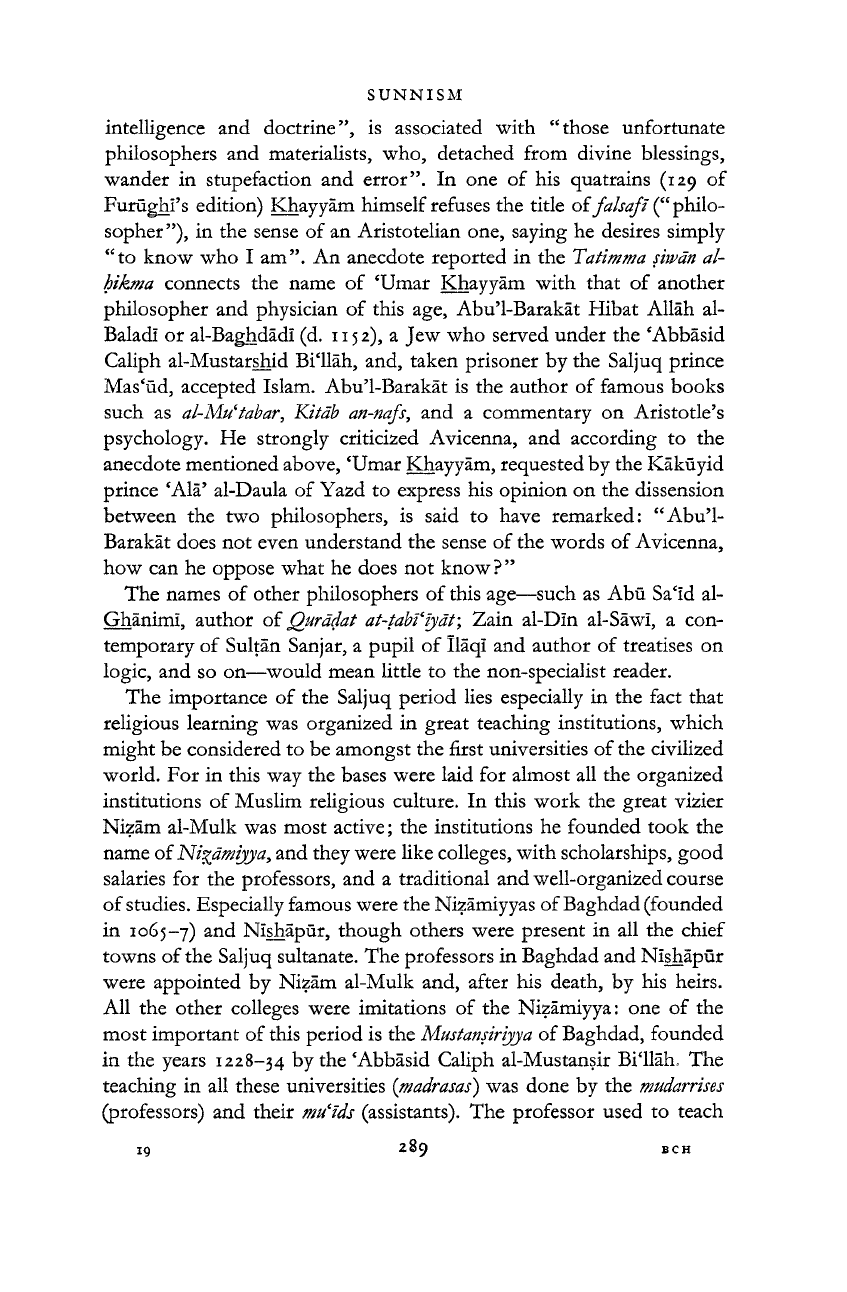
SUNNISM
intelligence
and doctrine", is associated with "those
unfortunate
philosophers and materialists, who, detached from divine blessings,
wander in stupefaction and
error".
In one of his
quatrains
(129 of
Furughi's edition) Khayyam himself refuses the title
of
^/^/("philo-
sopher"), in the sense of an Aristotelian one, saying he desires simply
"to know who I am". An anecdote reported in the
Tatimma
siwdn
al-
hikma
connects the name of 'Umar Khayyam with
that
of another
philosopher and physician of this age, Abu'l-Barakat Hibat
Allah
ai-
Baladi
or al-Baghdadi (d.
115
2),
a Jew who served
under
the 'Abbasid
Caliph
al-Mustarshid Bi'llah, and, taken prisoner by the Saljuq prince
Mas'ud,
accepted Islam. Abu'l-Barakat is the
author
of famous books
such as al-Mu'tabar, Kitab
an-nafs,
and a commentary on Aristotle's
psychology.
He strongly criticized Avicenna, and according to the
anecdote mentioned above, 'Umar
Khayyam,
requested by the Kakuyid
prince 'Ala' al-Daula of
Yazd
to express his opinion on the dissension
between
the two philosophers, is said to have remarked:
"Abu'l-
Barakat does not even
understand
the sense of the words of
Avicenna,
how
can he oppose what he does not know
?
"
The
names of other philosophers of this age—such as Abu Sa'id al-
Ghanimi,
author
of Qurddat
at-tabViydt\
Zain al-Din al-Sawi, a con-
temporary of Sultan Sanjar, a pupil of Ilaqi and
author
of treatises on
logic,
and so on—would mean little to the non-specialist reader.
The
importance of the Saljuq period lies especially in the fact
that
religious
learning was organized in great teaching institutions, which
might be considered to be amongst the first universities of the
civilized
world.
For in this way the bases were laid for almost all the organized
institutions of Muslim religious culture. In this work the great vizier
Nizam
al-Mulk was most active; the institutions he founded took the
name
of
Ni%dmiyya,
and they were like
colleges,
with scholarships, good
salaries for the professors, and a traditional and
well-organized
course
of
studies.
Especially
famous were the
Nizamiyyas
of Baghdad (founded
in 1065-7) and Nishapur, though others were present in all the
chief
towns of the Saljuq sultanate. The professors in Baghdad and Nishapur
were
appointed by Nizam al-Mulk and, after his death, by his heirs.
All
the other colleges were imitations of the Nizamiyya: one of the
most important of this period is the Must
amiriyya
of
Baghdad,
founded
in the years 1228-34 by the 'Abbasid Caliph al-Mustansir Bi'llah, The
teaching in all these universities
{madrasas)
was done by the mudarrises
(professors) and their
mu'ids
(assistants). The professor used to teach
19
289
BCH
